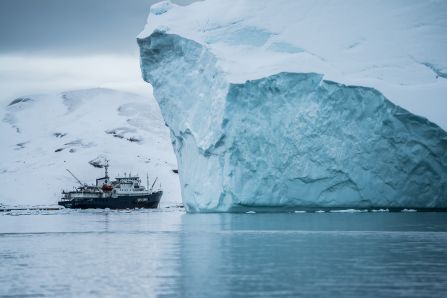
7 December 2021
When thinking about addressing climate change and implementing climate policy, the most effective approaches are international in nature. Cooperation and collaboration between countries help us think in more nuanced ways when it comes to finding solutions, creating sustainable policy, and building institutions that can help support our efforts to fight climate change.
As a Ph.D. student at Colorado State University (CSU), my research analyzes the intersection of climate change and security. My dissertation research asks the question: how influential are security expert communities in framing the Arctic as the next theater of great power competition given climate change as a driving force? My goal is to develop a four-case study on the United States, Canada, Russia, and Norway to understand how and why different expert communities treat the Arctic in this securitized manner – and the extent to which that influence translates into government policy and action. I aim to show that sub-national activism and the agency of individuals are hugely important when it comes to thinking about the Arctic. In other words, we are not destined to default from climate change to climate conflicts and wars. We have the ability to reframe the future in more optimistic and cooperative ways.
Beyond my dissertation, some of my other research explores how a bottom-up human security approach could best be used to think about climate change as a global security threat in the Arctic, a project on which I collaborate with Kara Kat Hodgson of the Arctic University of Norway (UiT). Together we try to answer whether the Arctic Council effectively addresses local-level insecurities of Arctic residents, particularly those coming from climate change.
CSU’s Political Science department is known nationally and internationally for our focus in environmental politics and policy. Our faculty is recognized for their work on issues such as climate change, just transitions, green economy, energy, water, natural resources, urban sustainability, and environmental justice. Outside of the Political Science department, CSU also has a variety of interdisciplinary environmental initiatives such as the InTERFEWS program, the Center of Environmental Justice, the Colorado Water Center, the Energy Institute, and the One Water Solutions Institute – just to name a few.
Transatlantic climate networks such as the Transatlantic Climate Bridge (TCB) can be incredibly useful not only for researchers seeking collaboration, but also for information sharing. It can be difficult to navigate through the endless stream of data online, but by working with partners – whether in Germany, the United States, or Canada – we can ensure that our work isn’t duplicated and can share our results with others. Doing so internationally also does not minimize sub-national activism – to the contrary. Sub-national climate policy instruments and analyses benefit from frameworks that can disseminate their existence to a broader audience and ultimately help achieve their real-world application.
If you’re interested in working together on questions of climate security or the Arctic, please feel free to reach out to me at ggricius colostate [dot] edu (ggricius[at]colostate[dot]edu) or through my website. Transatlantic cooperation might seem like a foreign or uncertain concept, but it offers an opportunity for new ideas and proposals that have a real chance of success. The TCB and its affiliates offer a variety of ways to be more involved, whether by attending or hosting climate dialogues or publishing climate research and analysis. Speaking from personal experience, transatlantic cooperation has made my research significantly more nuanced. By engaging with German and other European colleagues, I have learned how climate and security are conceptualized differently when it comes to the Arctic. American researchers, for example, tend to think about security in more ‘hard security’ terms whereas I have found German and more broadly European colleagues employ a wider definition that encompasses food security, societal security, and other aspects of security that complicate the picture. Dialogue and cooperation with other researchers can only benefit our collective understanding of climate security.
colostate [dot] edu (ggricius[at]colostate[dot]edu) or through my website. Transatlantic cooperation might seem like a foreign or uncertain concept, but it offers an opportunity for new ideas and proposals that have a real chance of success. The TCB and its affiliates offer a variety of ways to be more involved, whether by attending or hosting climate dialogues or publishing climate research and analysis. Speaking from personal experience, transatlantic cooperation has made my research significantly more nuanced. By engaging with German and other European colleagues, I have learned how climate and security are conceptualized differently when it comes to the Arctic. American researchers, for example, tend to think about security in more ‘hard security’ terms whereas I have found German and more broadly European colleagues employ a wider definition that encompasses food security, societal security, and other aspects of security that complicate the picture. Dialogue and cooperation with other researchers can only benefit our collective understanding of climate security.
So please - reach out!

